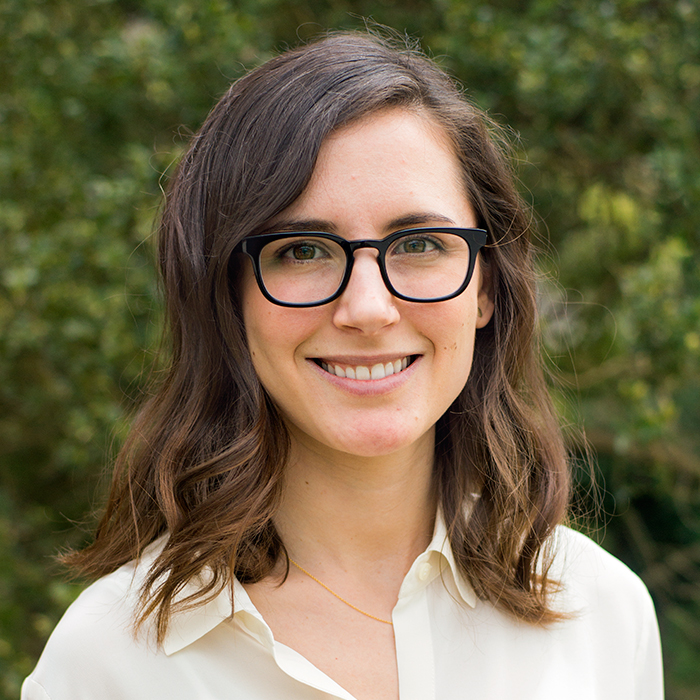Lindsay Reckson Wins 2020 Lindback Distinguished Teaching Award

Assistant Professor of English Lindsay Reckson was selected as the Lindback Distinguished Teaching Award winner. Photo by Patrick Montero.
Details
The award recognizes full-time faculty members with outstanding teaching records.
Last spring, at the final faculty meeting of the semester, conducted via Zoom, Lindsay Reckson was just hoping to get through the meeting while keeping her two small children from falling out of the stroller she was pushing simultaneously. The assistant professor of English certainly wasn’t prepared to be singled out for her classroom excellence. But when President Wendy Raymond announced the winner of the annual Lindback Distinguished Teaching Award, it was her name that was called.
“I was very moved...and grateful for the recognition,” said Reckson of the surprising announcement. “At the same time, I was thinking about how my students make it possible for me to show up for them by constantly showing up for me: challenging me to ask new and different questions, to read differently, to devote more care and attention to something I had overlooked.”
The Lindback Award, which includes a stipend of $4,000 from theChristian R. and Mary F. Lindback Foundation, is awarded every other year at Haverford and at other colleges and universities primarily across the Greater Delaware Valley in recognition of full-time faculty members with outstanding teaching records. Its recipients are decided by the individual institutions, and at Haverford, that means being selected by Academic Council, a faculty committee that includes the president and provost.
“This is such a bizarre and challenging moment to be a teacher—and, for that matter, a human being,” said Reckson. “Getting this award in this moment means my students and I are succeeding at being human together, doing the work—whatever the work is—and trying to help each other through. I share this award with them, and with my colleagues who are also muddling along with their unruly children and/or cats in the background.”
Since joining the Haverford faculty in the fall of 2013, Reckson has taught and created courses not only in the Department of English, but also in the Visual Studies Program (and at the junction of the two). She has taught courses on “Realism, Race, and Photography,” “Opposing Capital Punishment in American Literature, and the “Junior Seminar” necessary for English majors, among others. Her own research interests include American and African-American literary studies, performance studies, media studies, and religion. And her book, Realist Ecstasy published earlier this year, explores the intersection and history of American literary realism and the performance of spiritual and racial embodiment.
“I’ve also been lucky to get to develop my courses as part of a broader ecosystem of learning that happens at the college and beyond,” she said. “Before coming to Haverford, I approached my classes as relatively self-enclosed thought laboratories. With a lot of help from staff educators, IITS, librarians, community members, activists, and my students, I now think of my courses as nodal points, deeply interwoven with—and dependent on—other sites and practices of learning.”
In 2017, Reckson was part of the team that proposed the Philadelphia Area Creative Collaboration, Sounding the Archive, alongside fellow faculty member Thomas Devaney, artist Jeanine Oleson, and Brian Carpenter, a curator at the American Philosophical Society. That project aimed to help students grapple with settler-colonial photography and indigenous archives. In fall 2018, she organized a symposium and related Cantor Fitzgerald Gallery exhibit, The Legacy of Lynching, that drew on the Equal Justice Initiative’s long-term efforts to research, document, and memorialize victims of lynching.
Reckson is currently on sabbatical, working on a new book project, Experimental Gestures, and developing new courses. But even though she won’t be in a classroom this year, the Lindback Award-winning teacher is still thinking about how to adapt her pedagogy to this era of virtual and hybrid teaching and how to use her profession as an instrument for change.
“I’ve been inspired by friends and colleagues who are responding to this moment by foregrounding and redefining what pedagogical care looks like, and that’s something I’ll bring with me when I return to the classroom,” she said. “There’s a lot of creativity in the use of new platforms and interfaces, and that’s important—we’re all trying to figure out new modes of togetherness—but what matters to me more than ever is the capacity to make mutual care the basis of our intellectual projects. … More than anything, in this moment, I want classrooms, virtual or otherwise, to be spaces where students can do that creative work of imagining—and enacting—something different than the structures we’ve inherited.”



